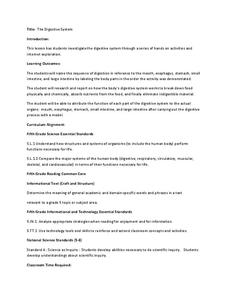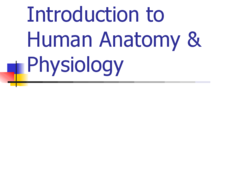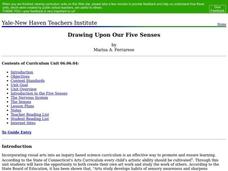Curated OER
Humans
For this anatomy worksheet, students read a passage about the different parts of the human body. They then answer the 10 questions on the page.
Curated OER
The Human Body: A Life-Size Model On Paper
Students create a life-size paper model of the human body. They identify the major organs and state their fuction. They complete a quiz to end the lesson.
Bridge
Mercury - Mercury is Rising
Hold a discussion in your class about the increase in mercury being found in fish that are caught commercially as food for humans. Given a worksheet, learners then calculate how much fish a person can safely eat each month to remain...
Curated OER
The Digestive System
Discover how the human body's digestive system works with a brain and stomach friendly activity. Scholars taste test a variety of foods to find out how they behave once in the mouth. Class members then play a game called Move That...
Curated OER
Bones: Reading and Quiz
Make no bones about it- this anatomy worksheet is all about the human skeleton! Learners read a 2-page informational excerpt on bones and then use the information they learned to answer 9 recall questions, including 4 multiple-choice and...
Curated OER
Introduction to Human Anatomy & Physiology
If the only support you are in search of is lists of vocabulary terms, this presentation may fit the bill. Slides simply list terminology. These categories are included: hierarchy of structural organization, cell functions, cell...
Curated OER
Circulatory Systems
A slideshow that covers the all-important details related to basic human circulation. The reasoning for exchange of material methods is presented and then labeled diagrams of the main human transfer systems are shown, along with...
Curated OER
Cranial Nerves
This page consists of a list of the cranial nerves in triplicate. The diagram of the brain that tops each copy of the list is too small for identifying each nerve. Consider giving your avid anatomists one of these lists with a large...
Curated OER
Drawing Upon Our Five Senses
Students observe and create artistic representations, technological images, and scientific diagrams. They explore the five senses, the structure and function of the corresponding organs, and how the senses are connected to the human brain.
Curated OER
Scatter-Brained
Seventh graders graph ordered pairs on a coordinate plane. They create a scatterplot. Additionally, they determine the line of best fit and investigate the slope of the line. Multiple resources are provided. An excellent resource!
Curated OER
The Laughing Brain 1: How We Laugh
Students to rate themselves on a scale from 1 to 10 (10 being the happiest) as to how happy they feel and write their rating on a sheet of paper. They explore gelotology (the science of laughter) and its benefits to our social, mental,...
Curated OER
Disorders of the Brain
Students, in groups, conduct research about a specific disorder of the brain, create a character study of a person with that brain disorder, and then present the information to the rest of the class.
Curated OER
Human Ancestry
In this human ancestry activity, students will answer questions about hominids, "Lucy", and the emergence of modern humans. Then students will compare the characteristics of Neanderthals and Cro-Magnons. This activity has four short...
Curated OER
Bird Brained?
Learners identify general abilities that indicate animal cognitive intelligence. In this biology instructional activity, students create an intelligence testing challenge for ravens. They compare its ability to that of a crow.
Curated OER
Teaching Neuro-anatomy Through Schematic Diagrams
Students develop a deeper understanding of the brain. In this neuro-anatomyl lesson plan, students will use simple diagrams to understand the brain and will progress to more complex diagrams as they gain understanding.
Curated OER
How Alzheimer's Affects the Brain
Young scholars study how Alzheimer's affects different parts of the brain, sketch a healthy neuron and its parts, and diagram brain changes during the early and late stages of Alzheimer's.
Curated OER
Exploring Learned and Innate Behavior
Students explore the differences between learned and innate behavior among humans and monkeys. They complete an assignment and read articles about two studies, which used similar test methods to show that infants and monkeys share an...
Exploratorium
Cardboard Tube Syllabus
Construct paper tubes and then try out a few optical illusion tricks:
See a virtual hole in your own hand
Get a grasp of how the eyes combine images
Notice that one eye is dominant over the other
Reveal how your eyes adjust to...
Curated OER
Entering the Eye
The human eye is the focus of this biology PowerPoint. The presentation takes a virtual trip inside of the human eye and allows learners to view the various parts of the eye. The best part (for me) are all of the optical illusions that...
LABScI
Vision Lab: The Eye
Our bodies have some amazing capabilities, but there are some limitations. Explore the limitations of the human eye through the eighth lab activity in a series of 12 biology lessons. Individuals measure their own peripheral vision...
Rochester Institute of Technology
Artificial Eye
Scientists in California developed a bionic eye that allows blind people to see edges of objects in black and white and costs $145,000. In the activity, groups of scholars discuss bioengineering, focusing on the human eye. They then...
University of Minnesota
Connect the Neurons!
Create a neuron frenzy as your pupils play the part of the neurons. An engaging lesson plan creates a human chain of neurons that pass cotton balls posing as neurotransmitters. Scholars learn about pre- and post-synapses as they...
Green Education Foundation
How Loud is Too Loud?
Ever wonder how loud a sound has to be to cause damage? Young scientists explore sound properties by researching decibel levels. They discuss how sound is perceived by our ears and our brains and why it can cause negative health effects...
Nuffield Foundation
Investigating How We See Colour
Can you eyes be fooled into seeing colors that aren't actually there? Budding scientists view a presentation that addresses this topic. They explore how their eyes interpret color through the retinas and messages sent to the brain. They...

























